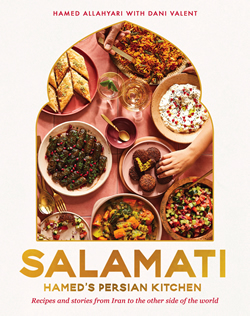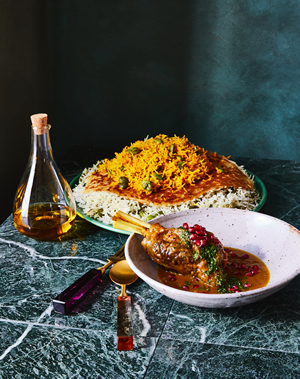By Christine Salins.
 “By eating my food, you come into my family. You are sitting with me, with my grandparents, parents and cousins, talking, sharing and enjoying the feeling of being together,” says Iranian-born Hamed Allahyari, who came to Australia as a refugee in 2012.
“By eating my food, you come into my family. You are sitting with me, with my grandparents, parents and cousins, talking, sharing and enjoying the feeling of being together,” says Iranian-born Hamed Allahyari, who came to Australia as a refugee in 2012.
Hamed was a chef and restaurateur in Iran when he realised his life was in danger and leaving was his only option. He travelled to Indonesia then by rickety fishing boat towards Australia where he was detained on Christmas Island.
Today, his is one of the happier refugee stories, his Melbourne restaurant SalamaTea a hard-won sanctuary where he takes great pride in sharing his beloved Persian dishes.
He hasn’t forgotten the perilous journey it took to get to this point: he is much loved in Melbourne for his advocacy for other refugees as well as his support for food service operators during the pandemic.
Hamed gained experience in Australia by volunteering to cook two days a week at the Asylum Seeker Resource Centre. When admirers of his cooking suggested he conduct classes, he was put in touch with a social enterprise called Free to Feed.
The popularity of his dishes there led him to launch his own restaurant, where he employs asylum seekers and refugees and delights in sharing his culture.
With the help of Melbourne journalist and cookbook author, Dani Valent, Hamed has now produced a gorgeous book filled with recipes and stories from Iran.
Salamati: Hamed’s Persian Kitchen (Murdoch Books, $45) is filled with recipes that are simple, celebratory and appealing, flexible and full of flavour.
The word, salamati, is Persian for “health” and “cheers”, and Hamed cooks for this moment when people are gathered around a table. As Dani Valent puts it so succinctly in the book’s foreword, the recipes are his “anchor to home and (his) hopeful gift to his new country”.
The dish here is one that is served in just about every restaurant in Iran. It’s a majestic dish, probably best served for a special occasion. Frozen broad beans can be used instead of fresh.
 Broad Bean Pilaf With Lamb Shanks
Broad Bean Pilaf With Lamb Shanks
Serves 4
4 lamb shanks
2 brown onions, halved
2 teaspoons ground turmeric
1 teaspoon ground cardamom
2 cinnamon sticks
Salt and freshly ground black pepper
Pomegranate jewels, to serve
Chopped flat-leaf parsley, to serve
BAGHALI POLOW
2 cups (400 g) long-grain basmati rice
2 teaspoons salt
500 g podded broad beans
4 garlic cloves, finely chopped
½ bunch dill, finely chopped
½ bunch coriander, stalks and leaves finely chopped
1 cup (250 ml) olive oil
Store-bought Persian or Lebanese flatbread
1 x quantity Saffron Liquid (see below)
To make the baghali polow, place the rice in a large bowl of cold water. Stir through 1 teaspoon of the salt and set aside for 1 hour.
Meanwhile, place the lamb shanks, onion, turmeric, cardamom and cinnamon sticks in a large stockpot, cover with water and place over high heat. Bring to the boil, then reduce the heat to low and simmer for about 2 hours (add an extra 1 cup/250 ml water if the mixture starts to dry out), until the lamb is tender and falling apart. Season with salt and pepper.
While the lamb is cooking, bring a small saucepan of water to the boil. Add the broad beans and cook for 5 minutes, until tender. Drain and refresh under cold running water, then peel the beans to reveal their bright-green interior.
Bring another saucepan of water to the boil. Drain the rice and rinse well, then add to the boiling water. Return to the boil and cook the rice for about 10 minutes, until tender. Stir through the broad beans, garlic, herbs and remaining salt, then drain if necessary.
Remove the lamb shanks from the sauce, then transfer the sauce to a blender, discarding the cinnamon sticks, and blend to a smooth gravy. Pour the gravy into a clean saucepan and simmer over medium–high heat to thicken slightly, if necessary.
Pour the olive oil into a non-stick wide shallow saucepan and gently lay the flatbread on top. Spoon the rice over the top of the flatbread, then place the pot over low heat and cook, covered, for 15 minutes. Transfer 2 cups (370 g) of the cooked polow to a bowl and stir through the saffron liquid.
To serve, invert the rice and tahdig onto a serving plate and spoon the saffron rice over the top. Divide the lamb shanks and gravy among shallow bowls and top with pomegranate jewels and chopped parsley. Serve with the polow on the side.
Saffron liquid
Makes ¼ cup (60 ml)
1 g saffron threads
1 tablespoon caster sugar
¼ cup (60 ml) boiling water
Grind the saffron and sugar using a mortar and pestle, then transfer to a heatproof bowl and stir through the boiling water to bleed the colour. Set aside for 5 minutes, then use wherever a recipe calls for saffron liquid.
Recipe and image from Salamati by Hamed Allahyari with Dani Valent, published by Murdoch Books, $45.











